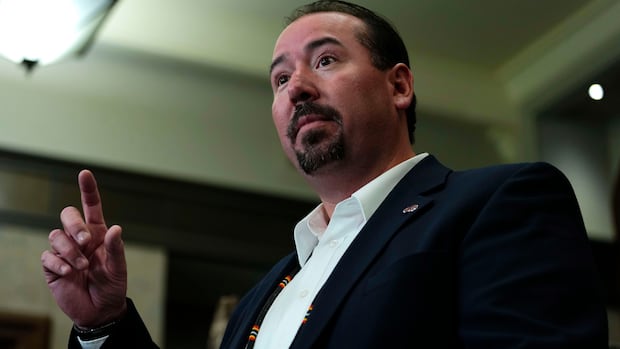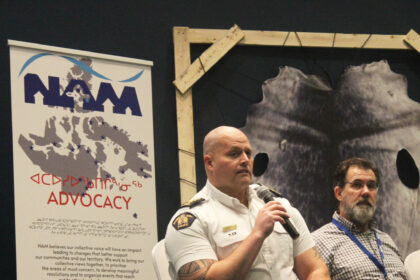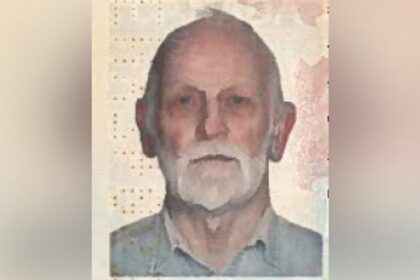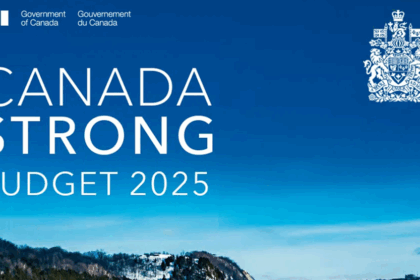IndigenousChiefs of Ontario has asked the federal government for $66.5 million to increase the capacity of the 133 First Nations in the province to handle major project requests under the constitutional duty to consult.Ontario regional chief says First Nations are already overwhelmed with consultation requestsOntario Regional Chief Abram Benedict speaks at a news conference against Bill C-5 in the foyer of the House of Commons on Parliament Hill in Ottawa in June. (Justin Tang/The Canadian Press)Ontario chiefs are calling for at least $500,000 per First Nation in funding from the federal government to cover the costs of consultation requests on projects fast-tracked under Bill C-5.Ontario Regional Chief Abram Benedict said First Nations were already inundated with consultation requests before Bill C-5, the Building Canada Act, was passed in June. The new law empowers cabinet to fast-track major projects deemed to be in the national interest. Now, Benedict said there’s frustration over how First Nations will manage consultation requests for these major projects.“First Nations want to be part of economic development opportunities. First Nations want to be part of prosperity, securing the economy of Ontario and Canada,” Benedict said.“But we need to be able to have the resources to do that, and investments in consultation capacity is one of them.”In its pre-budget submission to the federal government, the Chiefs of Ontario (COO) requested at least $500,000 annually be allocated to each of the 133 First Nations in Ontario to “cover the capacity requirements for consultations related to projects of ‘national interest,’ as identified under the [Building Canada Act.]”The COO said this funding, totalling $66.5 million, would allow First Nations to hire personnel to manage requests and technical experts, and to conduct surveys, community and cultural consultations and other work required.Benedict said $500,000 is not a lot given what is being asked of First Nations. “The burden is that the legal requirement for consultation may not be met,” he said.“Just sending the email is not going to be the bar of consultation for the proponents when it is development or when it is an action that’s going to adversely affect the rights of our people.”$40M pledgedThe Major Projects Office, launched in August to identify major projects in the national interest and streamline the approval process, is to provide $40 million over two years to increase the capacity of Indigenous peoples to engage in major projects.Pierre Cuguen, spokesperson for the Major Projects Office, said it understands that fast tracking major projects, “while emphasizing meaningful consultation, will require additional support, and [it is] working with Indigenous Peoples to determine how the government can best support.”Cuguen said further details “will be available in due course.”An Indigenous Advisory Council was formed in September to advise the Major Projects Office, however there have been complaints from First Nations and Métis groups over representation on the council.Benedict said $40 million, while a start, is not a lot when divided among the over 600 First Nations in Canada.“It’s definitely going to be exhausted pretty quickly, and we will lose opportunities because there’s no capacity and no significant investment in this area to be able to find a pathway forward,” Benedict said.Merle Alexander, a resource lawyer from the Kitasoo/Xai’xais First Nation, based in Victoria, said said $40 million over two years is too low given the number of Indigenous nations who will require funding, and said most major projects cost more than $40 million in consultation fees alone.“I think any reasonable person knows that number is too low, and or they know that the only reason that number is so low is because they’re not really going to fulfil the duty to consult,” he said.Alexander and Benedict said without consultation funding, there is likely to be legal action against proposed major projects.“It’s just going to be much easier to say no to a project you’re not informed of than yes to a project you’re fully informed of,” Alexander said. This year’s federal budget is expected on Nov. 4.ABOUT THE AUTHORJoy SpearChief-Morris is the recipient of the 2025 CJF-CBC Indigenous Journalism Fellowship. She is an Indigenous Black journalist and member of the Kainai Blood Tribe in Alberta. Joy has had bylines in The Globe and Mail, The Narwhal, The Walrus, The Toronto Star, CBC and Sportsnet.
Wednesday, 4 Feb 2026
Canada – The Illusion
Search
Have an existing account?
Sign In
© 2022 Foxiz News Network. Ruby Design Company. All Rights Reserved.
You May also Like
- More News:
- history
- Standing Bear Network
- John Gonzalez
- ᐊᔭᐦᑊ ayahp — It happened
- Creation
- Beneath the Water
- Olympic gold medal
- Jim Thorpe
- type O blood
- the bringer of life
- Raven
- Wás’agi
- NoiseCat
- 'Sugarcane'
- The rivers still sing
- ᑲᓂᐸᐏᐟ ᒪᐢᑿ
- ᐅᑳᐤ okâw — We remember
- ᐊᓂᓈᐯᐃᐧᐣ aninâpêwin — Truth
- This is what it means to be human.
- Nokoma










